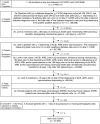Diabetes and drug-associated hyperkalemia: effect of potassium monitoring
- PMID: 20087674
- PMCID: PMC2842549
- DOI: 10.1007/s11606-009-1228-x
Diabetes and drug-associated hyperkalemia: effect of potassium monitoring
Abstract
Background: Renin-angiotensin-aldosterone system (RAAS) inhibitors are associated with hyperkalemia, but there is little evidence demonstrating patients who receive potassium monitoring have a lower rate of hyperkalemia.
Objective: To evaluate the association between potassium monitoring and serious hyperkalemia-associated adverse outcomes among patients with diabetes newly initiating RAAS inhibitor therapy.
Design: Retrospective observational study.
Participants: Patients with diabetes without end-stage renal disease initiating RAAS inhibitor therapy between 2001 and 2006 at three integrated health care systems.
Measurements: Potassium monitoring and first hyperkalemia-associated adverse event during the initial year of therapy. Hyperkalemia-associated adverse events included hospitalizations, emergency department visits or deaths within 24 h of hyperkalemia diagnosis and/or diagnostic potassium >or=6 mmol/l. Incidence rates were calculated in person-years (p-y). We used inverse probability propensity score weighting to adjust for differences between patients with and without monitoring; Poisson regression was used to obtain adjusted relative risks.
Results: A total of 19,391 of 27,355 patients (71%) received potassium monitoring. Serious hyperkalemia-associated events occurred at an incidence rate of 10.2 per 1,000 p-y. Compared to patients without monitoring, adjusted relative risk of hyperkalemia-associated adverse events among all patients with monitoring was 0.50 (0.37, 0.66); in the subset of patients who also had chronic kidney disease (n = 2,176), adjusted relative risk was 0.29 (0.18, 0.46).
Conclusions: Patients prescribed RAAS inhibitors who have both diabetes and chronic kidney disease and receive potassium monitoring are less likely to experience a serious hyperkalemia-associated adverse event compared to similar patients who did not receive potassium monitoring. This evidence supports existing consensus-based guidelines.
Similar articles
-
Increasingly restrictive definitions of hyperkalemia outcomes in a database study: effect on incidence estimates.Pharmacoepidemiol Drug Saf. 2010 Jan;19(1):19-25. doi: 10.1002/pds.1882. Pharmacoepidemiol Drug Saf. 2010. PMID: 19937982
-
Potassium-Binding Agents to Facilitate Renin-Angiotensin-Aldosterone System Inhibitor Therapy.Ann Pharmacother. 2016 Jun;50(6):502-10. doi: 10.1177/1060028016640794. Epub 2016 Mar 23. Ann Pharmacother. 2016. PMID: 27009290 Review.
-
Hyperkalemia After Initiating Renin-Angiotensin System Blockade: The Stockholm Creatinine Measurements (SCREAM) Project.J Am Heart Assoc. 2017 Jul 19;6(7):e005428. doi: 10.1161/JAHA.116.005428. J Am Heart Assoc. 2017. PMID: 28724651 Free PMC article.
-
Patiromer in patients with kidney disease and hyperkalemia receiving RAAS inhibitors.N Engl J Med. 2015 Jan 15;372(3):211-21. doi: 10.1056/NEJMoa1410853. Epub 2014 Nov 21. N Engl J Med. 2015. PMID: 25415805 Clinical Trial.
-
Potassium homeostasis and renin-angiotensin-aldosterone system inhibitors.Clin J Am Soc Nephrol. 2010 Mar;5(3):531-48. doi: 10.2215/CJN.07821109. Epub 2010 Feb 11. Clin J Am Soc Nephrol. 2010. PMID: 20150448 Review.
Cited by
-
Management of hyperkalaemia consequent to mineralocorticoid-receptor antagonist therapy.Nat Rev Nephrol. 2012 Dec;8(12):691-9. doi: 10.1038/nrneph.2012.217. Epub 2012 Oct 16. Nat Rev Nephrol. 2012. PMID: 23070570 Review.
-
Diabetes mellitus and electrolyte disorders.World J Clin Cases. 2014 Oct 16;2(10):488-96. doi: 10.12998/wjcc.v2.i10.488. World J Clin Cases. 2014. PMID: 25325058 Free PMC article. Review.
-
Barriers to guideline mandated renin-angiotensin inhibitor use: focus on hyperkalaemia.Eur Heart J Suppl. 2019 Feb;21(Suppl A):A20-A27. doi: 10.1093/eurheartj/suy030. Epub 2019 Feb 26. Eur Heart J Suppl. 2019. PMID: 30837801 Free PMC article.
-
Changing the medication documentation process for discharge: impact on clinical routine and documentation quality-a process analysis.Eur J Hosp Pharm. 2022 Jan;29(1):33-39. doi: 10.1136/ejhpharm-2019-002027. Epub 2019 Dec 20. Eur J Hosp Pharm. 2022. PMID: 34930792 Free PMC article.
-
Impact of ACEIs and ARBs-related adverse drug reaction on patients' clinical outcomes: a cohort study in UK primary care.Br J Gen Pract. 2023 Oct 26;73(736):e832-e842. doi: 10.3399/BJGP.2023.0153. Print 2023 Nov. Br J Gen Pract. 2023. PMID: 37783509 Free PMC article.
References
-
- Lindholm LH, Ibsen H, Dahlof B, et al. Cardiovascular morbidity and mortality in patients with diabetes in the Losartan Intervention For Endpoint reduction in hypertension study (LIFE): a randomized trial against atenolol. Lancet. 2002;359:1004–1010. doi: 10.1016/S0140-6736(02)08090-X. - DOI - PubMed
-
- Chobanian AV, Bakris GI, Black HR, Cushman WC, Green LA, Izzo JL. The seventh report of the joint national committee on prevention, detection, evaluation, and treatment of high blood pressure. JAMA. 2003;39(suppl 1):S94–S98. - PubMed
Publication types
MeSH terms
Substances
Grants and funding
LinkOut - more resources
Full Text Sources
Medical


